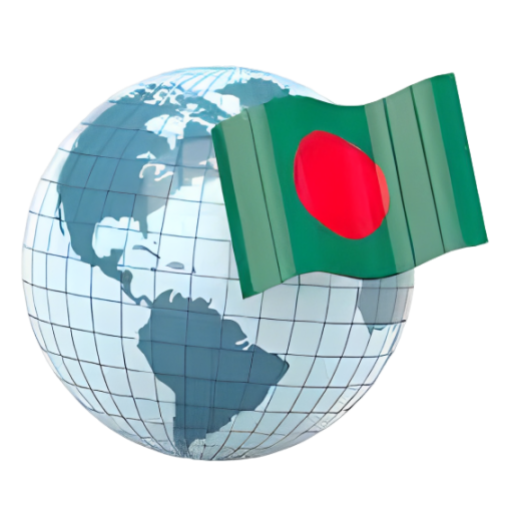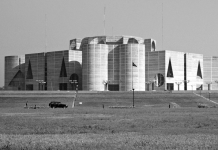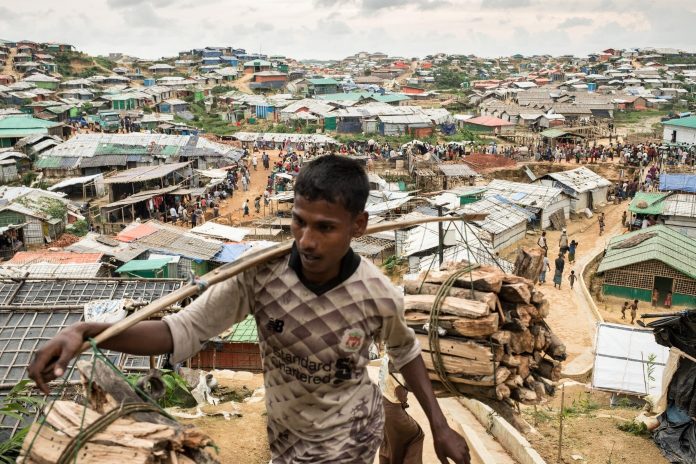
The recent political manifesto for the 12th National Parliament Election, presented by the Awami League President Sheikh Hasina on 27 December, 2023, has ignited significant discourse due to a conspicuous absence – the failure to address the Rohingya crisis. This oversight has not gone unnoticed and has raised serious concerns regarding the government’s dedication to tackling one of Bangladesh’s most pressing humanitarian issues. At the heart of this concern lies the sheer magnitude of the Rohingya refugee population, which stood at over 965,000 registered individuals as of September 2023. This staggering figure underscores the gravity of the situation and highlights the urgent need for attention and action. The Rohingya crisis is not merely a domestic affair; it resonates globally, impacting diplomatic relations and humanitarian efforts on an international scale.
The absence of any mention of the Rohingya crisis in the political manifesto signals a disregard for the plight of these displaced individuals and a failure to acknowledge the scale of the crisis. Such negligence not only undermines Bangladesh’s moral standing but also threatens to strain diplomatic ties with countries and organizations actively involved in addressing the crisis.
Internally, this oversight has exacerbated tensions within the domestic arena. It has led to disillusionment among citizens who expected their government to prioritize the Rohingya crisis and work towards finding sustainable solutions. The failure to address this issue in the political manifesto may be seen as a lack of empathy and foresight, potentially eroding public trust in the government’s ability to handle humanitarian crises effectively.
The Rohingya crisis and Bangladesh’s response
Originating from entrenched discrimination against the Rohingya ethnic minority in Myanmar, the Rohingya crisis escalated to its apex in 2017, triggering a massive exodus of refugees into Bangladesh. The Cox’s Bazar district, notably the Kutupalong-Balukhali mega-camp, emerged as a sanctuary for the displaced, precipitating a profound humanitarian emergency of unprecedented proportions. In response to this dire situation, the Bangladesh government has undertaken commendable efforts to address the crisis, demonstrating a proactive approach to mitigate the suffering of the Rohingya refugees. These efforts are manifest in various initiatives aimed at providing essential services such as shelter, food, healthcare, and education to the displaced population.

The government’s response has been characterized by collaboration with international organizations and non-governmental organizations (NGOs), showcasing Bangladesh’s commitment to managing the complexities of this humanitarian crisis. By working hand-in-hand with partners both domestically and internationally, Bangladesh has been able to leverage resources, expertise, and support to assist those in need.
The multifaceted response to the ongoing Rohingya crisis underscores the complexities inherent in addressing such a large-scale humanitarian emergency. It involves not only meeting the immediate needs of the displaced population but also striving towards long-term solutions that address the root causes of the crisis and ensure the rights and dignity of the Rohingya people are upheld.
While challenges persist, the concerted efforts of the Bangladesh government, in collaboration with its development partners, offer a glimmer of hope amidst the darkness of the Rohingya crisis. By prioritizing humanitarian principles and demonstrating solidarity with the displaced Rohingya community, Bangladesh exemplifies its commitment to compassion, human rights, and international cooperation in the face of adversity.
Governance gaps in crisis management

Indeed, despite commendable efforts, managing the Rohingya crisis in Bangladesh remains fraught with challenges that demand urgent attention and innovative solutions. The overwhelming influx of refugees has severely strained available resources, exacerbating the difficulty of providing essential services such as shelter, food, and healthcare to meet the needs of the displaced population.
The overcrowded conditions in the refugee camps, particularly in the Kutupalong-Balukhali mega-camp, have created a fertile ground for the spread of diseases and other health-related challenges. The lack of adequate sanitation facilities and clean water sources further compounds these risks, underscoring the urgent need for improved infrastructure and public health measures.
As the Rohingya crisis continues to unfold, the calls for increased transparency serve as a reminder of the importance of open dialogue, accountability, and collaboration in humanitarian response efforts. The government must heed these calls, prioritize transparency in its actions, and actively engage with stakeholders to address concerns and work towards sustainable solutions. Ultimately, transparency not only strengthens governance and accountability but also ensures that the rights and dignity of the Rohingya refugees are upheld.
Socio-economic impacts
The presence of Rohingya refugees in Bangladesh has indeed brought about significant socio-economic impacts on local communities, prompting a closer examination of the consequences and challenges faced by host populations. While addressing the humanitarian needs of the refugees remains a priority, there is a growing recognition of the strain placed on local resources, infrastructure, education, and healthcare systems.
The influx of Rohingya refugees has placed immense pressure on already limited resources in host communities, exacerbating existing challenges and disparities. The strain on infrastructure, such as housing, roads, and water supply, has become particularly pronounced in areas hosting large numbers of refugees. Additionally, the increased demand for services like healthcare and education has stretched local facilities to their limits, leading to overcrowding and decreased quality of services for both refugees and host communities.

Moreover, the presence of Rohingya refugees has had broader socio-economic implications, including competition for employment opportunities and increased competition for scarce resources. Residents may face challenges in accessing livelihood opportunities, as refugees may be willing to work for lower wages or accept precarious employment conditions. Balancing the imperative to provide support to the Rohingya population with the socio-economic impact on Bangladeshi communities presents a complex challenge. On the one hand, there is a moral obligation to provide humanitarian assistance to those in need, regardless of their nationality. On the other hand, neglecting the needs of host communities risks exacerbating tensions and fostering resentment towards refugees.
Furthermore, the environmental impact of hosting such a massive refugee population cannot be overstated. The pressure on local ecosystems, including deforestation for shelter construction and the depletion of natural resources, poses significant environmental challenges. The degradation of land and water sources not only threatens biodiversity but also exacerbates the vulnerability of both the refugee and host communities to environmental disasters and climate change impacts.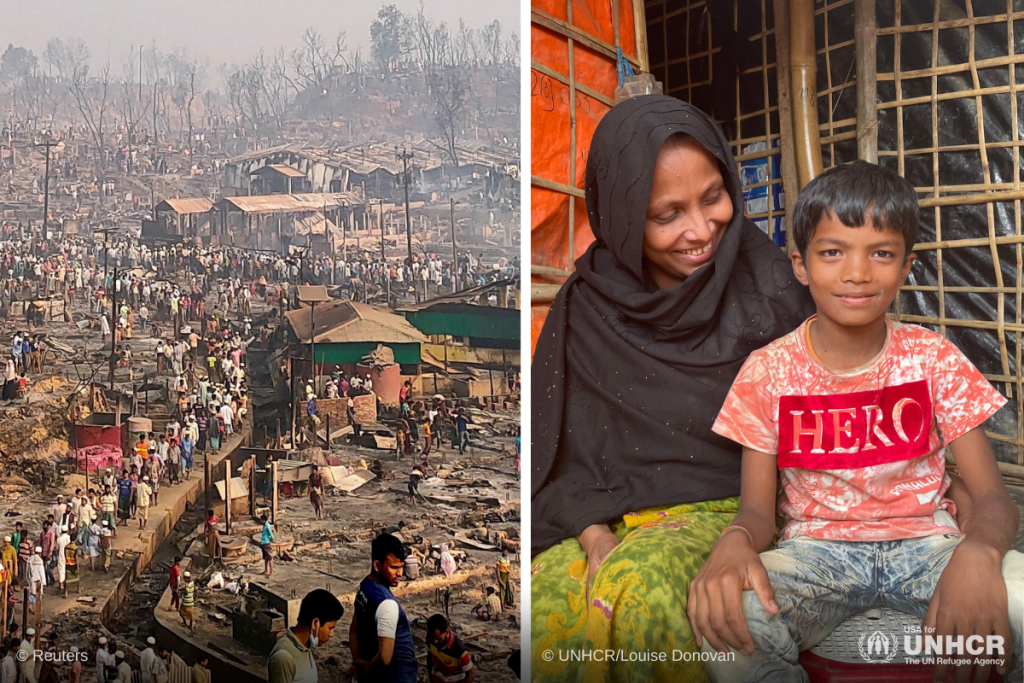
Collaborative efforts
In essence, addressing the challenges posed by the Rohingya crisis demands a concerted effort from all stakeholders, including governments, international organizations, NGOs, and local communities. By working together collaboratively and compassionately, it is possible to alleviate the suffering of the displaced Rohingya population while fostering sustainable solutions that benefit both the refugees and the host communities in Bangladesh.
Ultimately, addressing the socio-economic impacts of the Rohingya crisis on host communities requires comprehensive strategies that prioritize sustainable development, equitable resource allocation, and inclusive social policies. By addressing the root causes of socio-economic vulnerabilities and fostering greater collaboration between stakeholders, it is possible to mitigate the negative consequences of the crisis and build more resilient and inclusive communities in Bangladesh.
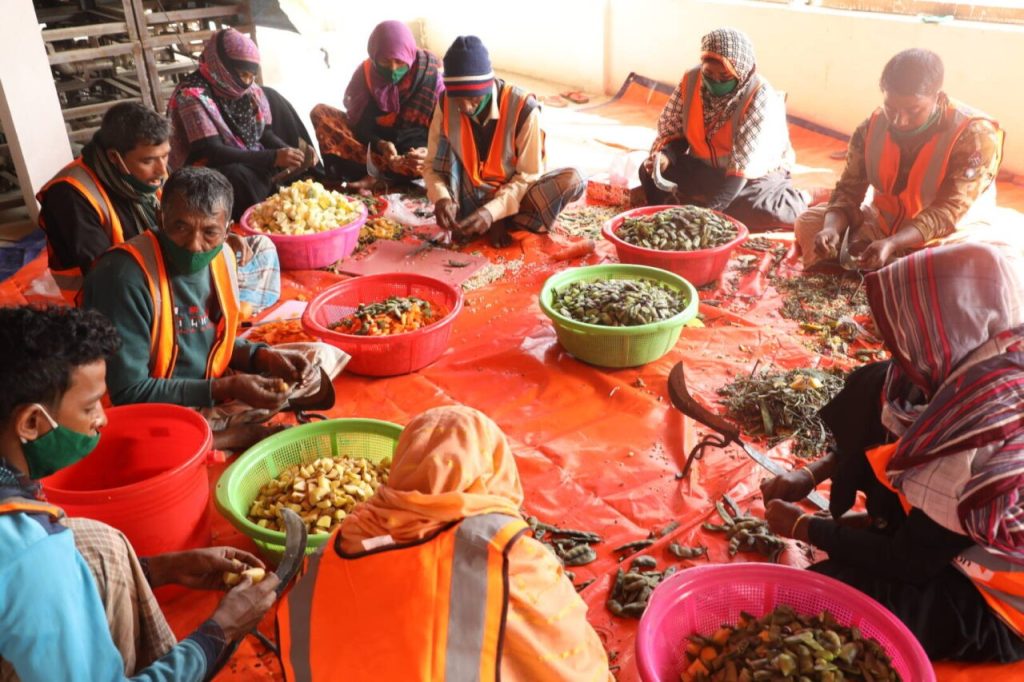
International aid and cooperation have indeed been indispensable in bolstering Bangladesh’s response to the Rohingya crisis, providing crucial support in terms of financial aid, resources, and expertise. Humanitarian agencies, non-governmental organizations (NGOs), and neighbouring countries have stepped up to contribute to efforts aimed at alleviating the suffering of the Rohingya refugees and improving their living conditions, healthcare, and access to education.
Financial aid from various international donors has been instrumental in filling gaps in funding and enabling the implementation of essential humanitarian programs. Additionally, the provision of resources such as food, shelter materials, medical supplies, and educational materials has helped meet the immediate needs of the displaced population.
Furthermore, the expertise and technical assistance offered by international humanitarian agencies and NGOs have been invaluable in enhancing the effectiveness of response efforts. These organizations bring specialized skills in areas such as healthcare, water and sanitation, psychosocial support, and education, thereby complementing the efforts of the Bangladesh government and local partners.
Neighbouring countries, particularly those in the region, have also played a crucial role by providing support and solidarity to Bangladesh in its response to the crisis. Whether through financial assistance, logistical support, or diplomatic engagement, these countries have demonstrated a commitment to addressing the Rohingya crisis collectively and mitigating its impact on the region.
The collective response to the Rohingya crisis underscores the importance of international solidarity and cooperation in confronting humanitarian emergencies of such magnitude. By pooling resources, expertise, and efforts, the international community can effectively address the immediate needs of the affected population while also working towards long-term solutions that promote stability, resilience, and human dignity.
However, it is essential to recognize that sustained international support and cooperation are needed to address the protracted nature of the Rohingya crisis adequately. Continued engagement and collaboration among governments, international organizations, NGOs, and other stakeholders are essential to ensure that the needs of the Rohingya refugees are met, and efforts towards finding a sustainable resolution to the crisis are pursued diligently.
“Good governance” and international efforts critical for long-term solutions
Looking towards the future, addressing the Rohingya crisis in Bangladesh demands a shift towards sustainable solutions that prioritize transparency, accountability, and long-term viability. This requires a comprehensive examination of strategies aimed at addressing the root causes of the crisis and ensuring the well-being of Rohingya refugees in the country.
International cooperation is crucial in this endeavour, underscoring the need for collaborative efforts between nations, organizations, and stakeholders. By working together, the international community can exercise diplomatic leverage to tackle the complex dynamics surrounding the Rohingya crisis effectively.
Calls for transparency surrounding the Bangladesh government’s handling of the Rohingya crisis have intensified in response to perceived shortcomings in communication and accountability. Human rights groups and activists have been vocal in expressing concerns about the opacity of the government’s approach, advocating for clearer communication and greater accountability in addressing the crisis.
Central to these calls is the demand for access to information regarding the conditions within refugee camps, the progress of repatriation efforts, and the overall management of the crisis. Critics argue that without transparency, it becomes challenging to assess the effectiveness of government policies and interventions, as well as to hold authorities accountable for any shortcomings or human rights violations.
The need for increased transparency is not merely a matter of procedural propriety; it is also essential for ensuring the well-being and rights of the Rohingya refugees. Transparent communication allows for greater scrutiny of the conditions in refugee camps, enabling humanitarian organizations and advocacy groups to identify areas of concern and advocate for necessary improvements. Moreover, transparency is crucial for fostering trust and cooperation between the government, humanitarian organizations, and the international community. By providing accurate and timely information, the government can demonstrate its commitment to accountability and collaboration in addressing the Rohingya crisis effectively.
In sum, sustainable solutions must go beyond addressing immediate humanitarian needs and aim to address the underlying factors contributing to the crisis. This may involve efforts to promote peace, stability, and respect for human rights in Myanmar, as well as initiatives aimed at fostering social cohesion and economic empowerment within Rohingya communities.
Innovation is also key to finding enduring solutions to the Rohingya crisis. This may include exploring new approaches to refugee management, such as community-based initiatives that empower refugees to become self-reliant and active participants in their recovery.

M. Rezaul Islam
Dr. M. Rezaul Islam, Professor of Social Work at the University of Dhaka, Bangladesh, boasts 27 years of experience in teaching and research. His expertise spans social work, community development, climate change, and migration studies. Recognized globally, he has authored over 120 impactful journal articles and 15 books, focusing on social justice and empowerment for marginalized communities. E-mail: rezauldu@gmail.com
